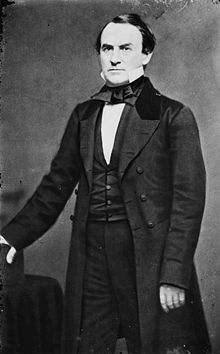Charles J. Faulkner
| Charles James Faulkner | |
|---|---|
 |
|
| Member of the U.S. House of Representatives from West Virginia's 2nd district |
|
|
In office March 4, 1875 – March 3, 1877 |
|
| Preceded by | John Hagans |
| Succeeded by | Benjamin F. Martin |
| United States Minister to France | |
|
In office March 4, 1860 – May 12, 1861 |
|
| Appointed by | James Buchanan |
| Preceded by | John Y. Mason |
| Succeeded by | John Bigelow |
| Member of the U.S. House of Representatives from Virginia's 8th district |
|
|
In office March 4, 1853 – March 3, 1859 |
|
| Preceded by | Alexander Holladay |
| Succeeded by | Alexander Boteler |
| Chairman of the Committee on Military Affairs | |
|
In office March 4, 1857 – March 3, 1859 |
|
| Preceded by | John B. Weller |
| Succeeded by | Benjamin Stanton |
| Member of the U.S. House of Representatives from Virginia's 10th district |
|
|
In office March 4, 1851 – March 3, 1853 |
|
| Preceded by | Richard Parker |
| Succeeded by | Zedekiah Kidwell |
| Member of the Virginia House of Delegates from Berkeley County | |
|
In office 1848 Alongside William Boak |
|
|
In office 1832–1833 Alongside William Good and Levi Henshaw |
|
|
In office 1829 Alongside Elisha Boyd |
|
| Member of the Virginia Senate from Berkeley, Morgan and Hampshire Counties | |
|
In office 1837–1841 |
|
| Preceded by | William Donaldson |
| Succeeded by | Thomas Sloan |
| Personal details | |
| Born |
July 6, 1806 Martinsburg, Virginia |
| Died | November 1, 1884 (aged 78) Martinsburg, West Virginia |
| Political party | Democratic |
| Other political affiliations |
Whig |
| Spouse(s) | Mary Wagner Boyde Faulkner |
| Profession | Politician, Lawyer |
| Military service | |
| Allegiance | Confederate States of America |
| Service/branch | Confederate Army |
| Rank | Assistant adjutant general |
| Battles/wars | American Civil War |
Charles James Faulkner (July 6, 1806 – November 1, 1884) was a nineteenth-century politician and lawyer from Virginia and West Virginia. He was the father of Charles James Faulkner.
Faulkner was born in Martinsburg, Berkeley County, Virginia (now West Virginia). Faulkner graduated from Georgetown University in Washington, D.C. in 1822, studied law and was admitted to the bar in 1829. Faulkner was the father of a son of the same name, Charles James Faulkner (1847-1929)
As an adult, Faulkner practiced law in Berkeley County. He was elected a member of the Virginia House of Delegates 1832-33. Soon after Faulkner was appointed a commissioner to report on the boundary between Virginia and Maryland.
Later in his career, Faulkner was elected to the Virginia State Senate in 1841, and again to the General Assembly in 1848. In 1848 he introduced in the Virginia House of Delegates a law after which the Fugitive Slave Act of 1850 was modeled.
In 1850, Faulkner was elected to the Virginia Constitutional Convention of 1850. He was one of four delegates elected from the northern Valley delegate district made up of his home district of Berkeley County as well as Jefferson and Clarke Counties.
Faulkner was a U.S. Representative from 1851 to 1858 Entering Congress as a Whig, the next Congress Faulkner was elected as a Democrat, which he remained for the rest of his Congressional career.
Faulkner was elected a Whig and Democrat to the United States House of Representatives in 1850, serving from 1851 to 1859. There, he served as chairman of the Committee on Military Affairs from 1857 to 1859.
...
Wikipedia
